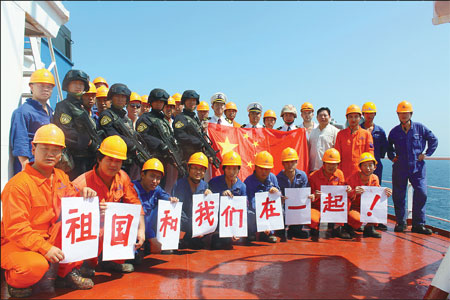Navy protects ships from pirates
Updated: 2012-12-29 01:33
By Zhao Shengnan (China Daily)
|
||||||||
 |
|
Some officers and sailors of Chinese navy take pictures during a naval escort together with Chinese vessels crews being protected, who held up banners writing "The country stays with us." Provided by the publicity office of the South Sea Fleet |
China's escort fleet in Gulf of Aden, Somali waters makes significant contribution
On March 25, one month after leaving Qingdao, Shandong province, Captain Wang Haijiang felt a bit more excited than usual. "Pirates had finally appeared," he recalled.
"There were five batches of pirates harassing the fleet, but we, as part of the well-trained Chinese navy, were confident and would never be intimidated, even if war broke out," the chief of the missile destroyer Qingdao, from the North Sea Fleet, told China Daily.
On Wednesday, the People's Liberation Army navy observed the fourth anniversary of sending escort fleets to the Gulf of Aden and Somali waters.
Wang has every reason to be confident.
From February to September, the 11th escort fleet, with three ships and a crew of 800 from the North Sea Fleet, escorted 184 vessels, and inspected and drove away 126 suspicious ships in the area.
Over the past four years, the PLA navy has provided 13 groups with 34 warships, 28 helicopters and nearly 10,000 military men as escorts. More than 5,000 ships from China and the rest of the world were successfully protected.
The escort helped China to increase its anti-piracy capability and helped make the Gulf of Aden and Somali waters a safer place, experts said.
Improved capabilities
The Chinese navy has made an important contribution to the sharp decline in piracy over the past four years, said Zhang Junshe, deputy director of the Naval Military Studies Research Institute.
Somali pirate attacks fell to 70 in the first nine months of this year, compared with 199 incidents in 2011. It was the lowest number in three years as tougher navy action and private armed security teams deterred gangs, the International Maritime Bureau said in October.
There has not been a successful hijacking of a merchant vessel off Somalia in the second half of this year, Reuters quoted outgoing commander of the NATO mission, Ben Bekkering, as saying this month.
The navy accumulated enough experience to optimize its escort methods. It simplified and diversified procedures, and developed a regular escort schedule, experts said.
The navy is continuing to improve its combat capability by adapting to the pirates' new tactics, said Yang Junfei, commander of the 11th escort fleet and political commissar of the North Sea Fleet.
To address the increasing number of pirate attacks at dawn and dusk, for instance, the fleet, led by Yang, conducted its first day-and-night drill, involving warships and helicopters in the Indian Ocean in March.
Pirates have extended their activities from Somalia and the Gulf of Aden to the western coast of India and Sri Lanka, the Red Sea, the Gulf of Oman and the Mozambique Channel, he said.
They have changed their targets from slow, low merchant vessels to big, high ones carrying coal and oil, said Yang.
"The troops have never stopped training, in order to be ready for any threat," he said.
Efficient methods
Captain Liu from Nanjing Ocean Shipping Co Ltd is one of many who benefited from the Chinese navy's efficient anti-piracy methods.
Liu, with two decades of shipping experience, almost felt "hopeless" when he learned in Nanjing on April 6 that the company's vessel Xianghuamen had been attacked and 28 crew member had been kidnapped by pirates in waters off Iran.
The 11th escort fleet headed to Iran the moment they got the information and actively coordinated with the nearby international naval forces for assistance at the same time.
Ten hours later, all the kidnapped crew members were rescued by the Iranian navy.
"The responsibility and flexibility that the Chinese navy showed during the rescue were really impressive," Liu said, adding that Chinese escort fleets have regular departure schedules, but they often leave one warship behind to wait for merchant ships that are late due to extreme weather.
If the warship did not wait for merchant ships, "the company would lose thousands of dollars and face the danger of piracy every day".
The company did not reduce its shipping business to the area after the incident, said Liu. "With the PLA navy's protection, we are not afraid of pirates."

 Relief reaches isolated village
Relief reaches isolated village
 Rainfall poses new threats to quake-hit region
Rainfall poses new threats to quake-hit region
 Funerals begin for Boston bombing victims
Funerals begin for Boston bombing victims
 Quake takeaway from China's Air Force
Quake takeaway from China's Air Force
 Obama celebrates young inventors at science fair
Obama celebrates young inventors at science fair
 Earth Day marked around the world
Earth Day marked around the world
 Volunteer team helping students find sense of normalcy
Volunteer team helping students find sense of normalcy
 Ethnic groups quick to join rescue efforts
Ethnic groups quick to join rescue efforts
Most Viewed
Editor's Picks

|

|

|

|

|

|
Today's Top News
Health new priority for quake zone
Xi meets US top military officer
Japan's boats driven out of Diaoyu
China mulls online shopping legislation
Bird flu death toll rises to 22
Putin appoints new ambassador to China
Japanese ships blocked from Diaoyu Islands
Inspired by Guan, more Chinese pick up golf
US Weekly

|

|






